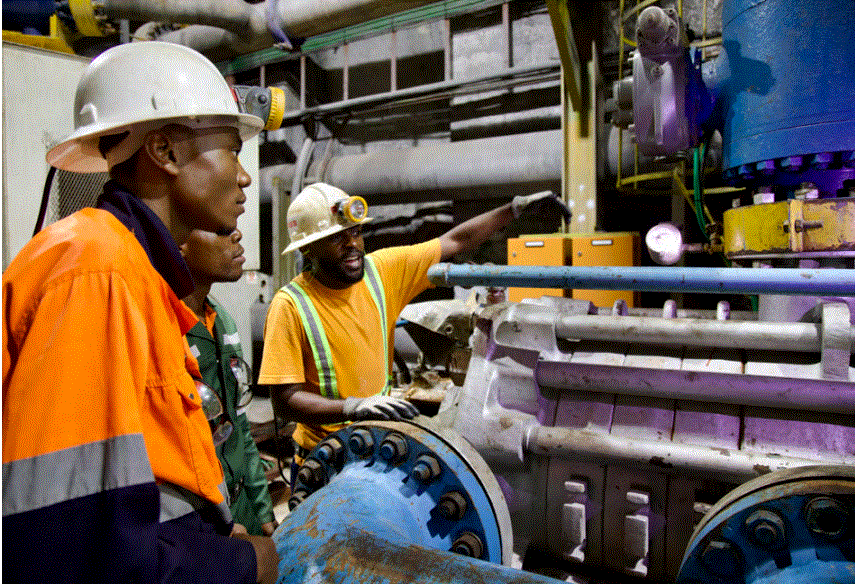
This article was co-authored by Ines Kaempfer, CEO of The Centre For Child Rights and Business and David Sturmes, Corporate Engagement and Strategic Partnerships, Fair Cobalt Alliance. Read the original article published on Fair Cobalt Alliance here.

Across the country, the Kolwezi area in Lualaba Province is known as a boom town, with swaths of people finding employment in both the industrial and artisanal mining sectors. Mining is the backbone of the local economy and has helped thousands of families across the region build homesteads, invest in farming, and put their children through school and in many cases even university.
However for many in the local community, and this is true particularly for young people with no or little education, jobs within or related to the formal mining industry remain unattainable and they instead work in the more informal and hazardous artisanal and small-scale (ASM) mines.
Let’s take a step back. If you were 16 or 17 years old living somewhere in the Kolwezi area today, having finished or dropped out of school – as is the case for 32% of the children of artisanal miners, what options do have to find work in the wider copper-cobalt belt area? As of the end of 2021, the unemployment rate in the DRC was estimated to be 23.7%, with 42.3% of youth lacking opportunities. A lack of decent work opportunities in the formal economy is forcing young workers to look for employment in often hazardous sectors, among them in ASM mining.
As a result, cobalt extraction suffers from its association with child labour at artisanal mine sites – a persistent problem which requires business leaders, co-operatives and politicians to collaborate to solve.
Giving Youth an Economic Prospect
In the formal sector, industrial mining is the most developed and significant employer in the region. Industrial mines’ operations drive the organic growth of neighbouring villages or towns, driving increased food production and accompanying services such as landscaping, cooking and cleaning, or road maintenance services, to name just a few activities.
The formal mining sector is, therefore, ideally placed to support youth development and employment opportunities for youth over the age of 16. The sector can play a leading role by offering apprenticeship and internship opportunities at mining companies, and by facilitating decent work opportunities for youth in the services and activities that exist to support the sector.
To get there, mining companies and their suppliers across the country need to step up and step away from traditional policies that are currently limiting employment for all positions to persons above 18 years, and instead broaden their focus to offer decent work to adolescents looking for an entry into the formal employment. Apprenticeship and internship programmes can be offered to support boys and girls that are over 16 years of age (the legal working age) and out of school or offered to those that have finalised their formal education and are keen to learn practical trades.
The Opportunity at Hand
The Fair Cobalt Alliance (FCA) is working with The Centre for Child Rights and Business and partners to implement child labour remediation and youth development programmes in and around artisanal and small-scale mining (ASM) sites in the Kolwezi area. Through our work, we are painfully aware of the lack of decent work opportunities for youth at ASM sites that exist alongside the industrial mine sites.
The formal mining sector holds huge potential for youth to gain invaluable experience in practical work and to help them become employable and gain a foothold in the formal economy. As part of our child labour remediation (CLR) work, the FCA is rolling out an apprenticeship programme connecting out-of-school youth looking for non-hazardous work and training opportunities with companies wishing to cultivate a motivated, young workforce with decent and safe workplaces.
On top of being the right and responsible thing to do, the apprenticeship programme plays a crucial role in preventing child labour by alternative decent work opportunities to youth above 16 years of age who would otherwise by engaged in hazardous work informal ASM sectors. Every adolescent finding an apprenticeship program in the formal sector is a child taken away from dangerous and hazardous work on the streets or in informal ASM mines. The programme also offers positive business benefits for participating companies by providing access to a new generation of committed and trained workers. It is also aligned with key sustainability initiatives such as UN Sustainable Development Goal (SDG) Goal 8 which calls for Decent Work and Economic Growth, and SDG Goal 8.7 which calls for the eradication of Child Labour (including hazardous work for young workers) in all its forms by 2025.
Practical Ways for Your Company to Get Involved
Fair Cobalt Alliance, The Centre for Child Rights and Business, and partners are leading this work. We appeal to mining companies and contractors to consider opening their gates to youth interested in vocational training opportunities, apprenticeships and internships.
We are ready to support your company to create decent work for youth in the DRC. Please reach out to us at info@childrights-business.org to discuss opportunities or a tailored programme for your company.
By using this website, you agree to our use of cookies. We use cookies to provide you with a great experience and to help our website run effectively.